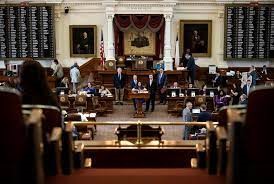
Here’s a quick recap of what happened over the last week:
Special Session Update

On Tuesday, the House passed two border and immigration related bills that had passed the Senate last week. House Bill 3 appropriates $1.5 billion towards the state’s continued effort of building a wall along the border with Mexico. The House made one slight change regarding reimbursement of local authorities regarding detainment of migrants. That will require the bill to go back to the Senate for consideration, where they can accept the amendment or send the bill to conference committee.
The House also passed Senate Bill 4, which allows state law enforcement to arrest migrants suspected of entering the country illegally. Also, in lieu of prosecution, the new law would allow state judges to issue an order of deportation. If the individual refuses the order of deportation, then they will face a penalty of up to 20 years in prison. Democrats adamantly opposed the legislation, saying it will lead to racial profiling and lead to further distrust of law enforcement in certain communities. The Democrats introduced more than 50 amendments to try and water down the bill. But after the first few went down on party lines, the House moved to finally pass the bill. The bill now heads to Gov. Abbott, who will undoubtedly sign the measure. The Democrats have also promised legal challenges to the bill, saying that there is no legal precedent for state level judges to enforce federal immigration law. In fact, in 2012, the US Supreme Court ruled that local law enforcement does not have the authority to arrest anyone based solely on immigration status and that responsibility falls to the federal government.
Mexico Rejects New Texas Law

The Mexican government responded to the legislation on Wednesday, saying it rejects any law or policy that allows for involuntary return of migrants without due process. In the statement issued by Mexico’s Secretary of Foreign Relations, Mexico said it has ordered its consulates to continue working with the US government regarding immigration matters, saying it has current agreements in place to accept Mexican citizens and citizens of other countries when they are legally deported by the US federal government, and that there is no precedence in place to create immigration policy with a US state over immigration matters. What complicates matters even worse, is that in fiscal year 2023 that ended September 30th — according to US Customs and Border Patrol – 83% of the 2.4 million migrants encountered last year were from countries other than Mexico.
Republican Senator Critical of Senate Border Legislation

Senator Brian Birdwell, a Republican from Granbury, has chaired the Senate Border Affairs committee for four years now. That is the committee with jurisdiction over all border and immigration related legislation that is filed for consideration in the Senate. Birdwell has even introduced and passed several different versions of border related legislation during the regular and subsequent special sessions this year. He introduced and passed a bill during the last special session that allowed state law enforcement to arrest and jail those that had crossed illegally on state trespassing charges.
But now, Birdwell is defiantly speaking out against the Senate’s latest proposal that allows for the arrest and jailing of illegal immigrants on trespassing charges, and also allows for state judges to order the deportation of those who have been entered the country illegally. Birdwell chose not to carry the legislation this session, and was the only Republican member of the Senate to oppose the legislation when the Senate passed it last week. In a speech on the Senate floor, Birdwell said the Senate is “setting a terrible precedent for the future by invalidating our obedience and faithfulness to our Constitution.” He went on to say that “President Biden’s failure to obey his oath does not compel us to violate ours.”
Republican Senator Charles Perry of Lubbock took over authorship of the legislation this session, and did acknowledge that the Senate legislation is going to be the subject of litigation over the question of how much if any power states have to enforce immigration laws. However, in defending his legislation, Perry argued the state has “every right to protect its citizens and the nation has every right to expect Texas to do that.” The bill passed the full chamber on a 17-11 vote and was then passed by the full House as mentioned above.
House to Debate Education Proposals

The House has passed the border enforcement and immigration related legislation for this special session, and will now turn its focus to public education. Today, the House will be debating the school voucher legislation. House Bill 1 sets up a $500 million fund to allow parents to access up to $10,500 annually for private school expenses. The House program prioritizes students with disabilities and those from low-income families. The bill also contains pay raises for teachers and other school district personnel and increases the daily allotment paid to school districts to make up for any attendance decreases due to the new voucher program.
The House will also take up legislation relating to school safety. The House is proposing a new fund of $1.3 billion to be available to all public schools to help pay for upgraded security systems, fencing, and additional security personnel. This fund would have to be approved by the voters in the next constitutional amendment election in May of 2024.
Expect a very long and contentious debate on the House floor today that will likely last well into the night. I will provide updates on any relevant developments.
Paxton Whistleblower Case Can Move Forward

Last week, a state district judge in Burnet County placed a temporary hold on the lawsuit brought forth by the former Attorney General employees that have accused AG Ken Paxton of firing them because they brought to light many of the allegations regarding abuse of office that eventually led to his impeachment trial. The judge put a temporary hold on the case after Paxton’s legal team filed for the injunction saying that a settlement had already been reached. The settlement of $3.3 million was key to the beginning of the House impeachment proceedings because they refused to pay the money to the whistleblowers, and found the allegations credible. After the Senate acquitted Paxton, the whistleblowers wanted to reopen the case since the settlement still had not been paid. The Texas Supreme Court ruled in favor of the whistleblowers, saying the trial could move forward. The filing by Paxton’s legal team was another attempt to squash the case. But, after putting a temporary hold on the case last week pending a full hearing, the judge ruled in favor of the whistleblowers and said the case can move forward. This means the whistleblowers are now free to subpoena impeachment records and take depositions.
Trump Visiting Texas

Former President Donald Trump will be in the Rio Grande Valley this weekend, which will be his second campaign swing through our state in the last month. Trump plans to visit Edinburg, and along with Gov. Abbott will be serving meals to state troopers and members of the National Guard that are stationed at the border. Trump still has a commanding lead in Texas over Nikki Haley and Ron DeSantis, but his two closest rivals have been spending a lot of time in Texas and have raised significant funds here. So far in 2023, Haley and DeSantis combined have raised over $6 million from Texas donors. Trump easily won the Republican primary here in 2020, but only won the statewide vote in the November election with 52% of the vote, the smallest margin of victory in the state for any Republican Presidential candidate over the last 30 years.
Political Notes
Saturday marked the opening of the filing period for candidates to file for the 2024 March primary. The filing period runs through Monday, December 11th, and always brings along some surprises.
With the announcement last week that state Senator Drew Springer would not seek reelection in 2024, the first surprise came when incumbent Republican Congressman Pat Fallon of Frisco announced he would run for the state Senate seat instead of returning to Congress. Fallon held the Senate seat for two years in 2019 and 2020, and immediately received the endorsement of Lt. Governor Dan Patrick. Fallon has long been rumored to be a statewide candidate in 2026, and probably thinks being in a state level office allows an easier path for fundraising and establishment of a statewide network. But, after announcing on Monday he would run for the Senate seat, he reversed course on Tuesday and announced he will seek reelection to Congress.
So that leaves Senate District 30 wide open again. Republican state Rep. Jared Patterson of Frisco is said to be considering a run, while emergency room physician Carrie de Moor has been up and running for the Republican nomination for several weeks.
Also in the Senate, first term Democrat Morgan LaMantia of South Padre Island will be in a rematch against Republican Adam Hinojosa next November — assuming both receive their respective party’s nomination — for the Valley based state Senate seat that runs from the Rio Grande Valley north up to areas surrounding Corpus Christi. What makes the district competitive for Republicans are the rural areas of Nueces County, as well as the red leaning counties of Bee, Kenedy, Kleberg, San Patricio, and Willacy. Hinojosa lost to LaMantia by only 659 votes in 2022.
In another surprising development, 20-year incumbent Republican Congressman Michael Burgess of Lewisville announced this week he will not seek reelection in 2024. Burgess succeeded longtime Congressman and former House Majority Leader Dick Armey in 2002. Former state Rep. Ron Simmons of Carrollton is considering a run in this solidly Republican seat.
The retirement of Republican state Rep. Geanie Morrison leaves her House District 30 seat open, and two have filed to run in the Republican primary in this safely red seat in the Victoria area. Victoria mayor Jeff Bauknight and Jackson County Sheriff Al Louderback will face off in the primary.
Democrat Denise Wilkerson of Arlington has filed to run against Republican incumbent Rep. Tony Tinderholt, also of Arlington. TInderholt is a leading voice against the incumbent Speaker Dade Phelan, and even challenged Phelan for the Speaker’s gavel in January. Tinderholt received only 3 votes in his quest to unseat Phelan. Tinderholt faced Democratic opposition in 2022, winning by 13 points.
House District 139 in Houston will be open next year after incumbent Rep. Jarvis Johnson declared his intention to run for state Senate District 7 in 2024. Legislative staffer Morrell Jenkins and licensed professional counselor Rosalind Caesar have filed to run in the Democratic primary in this safely blue seat which runs just north of Loop 610 in Houston up to the Beltway.
Another seat left open by an incumbent seeking another office is House District 97 in Fort Worth, where Republican incumbent Rep. Craig Goldman is running for Congress. Cheryl Bean, who owns a general contracting firm in Fort Worth announced this week she is seeking the Republican nomination in 2024. She joins Fort Worth attorney Leslie Robnett in the fight for the Republican nomination next year in the Republican leaning seat anchored in western Tarrant County.
What’s Next??
The Senate has basically completed its business for the special session, and will now await action from the House. The Senate is in recess until Tuesday, when they will receive the education measures, if passed by the House, and vote on whether or not to accept the House versions or go to conference committee.
After today’s lengthy debate, the House will likely also stand in recess until sometime Tuesday afternoon when they will be available to appoint a conference committee on the education measures, if that is what the Senate ultimately votes to do.
I will provide a very short update next week on the status of the special session as we head into the Thanksgiving holiday weekend.
